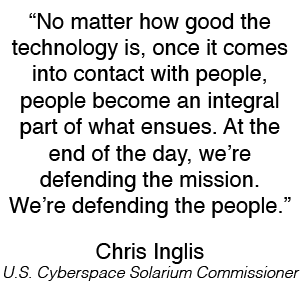Program Recordings and Recaps
 Today, there are 3.5 million cyber jobs worldwide. Only two-thirds of jobs in the U.S. federal government with a cyber classification are currently filled. The December 1 "Future of the National Security Cyber Workforce" event brought together leaders in the cyber field from across government and industry to discuss the need to organize, recruit, develop, retain, and create pathways for the cyber needs in today's world.
Today, there are 3.5 million cyber jobs worldwide. Only two-thirds of jobs in the U.S. federal government with a cyber classification are currently filled. The December 1 "Future of the National Security Cyber Workforce" event brought together leaders in the cyber field from across government and industry to discuss the need to organize, recruit, develop, retain, and create pathways for the cyber needs in today's world.
The program kicked off with keynote remarks from U.S. Cyberspace Solarium Commissioner, Chris Inglis, who discussed the Commission's report published in March 2020. The report made recommendations to better organize and unify national security cyber efforts, increase the recruitment, development, and retention of talent, and broaden the reach of national security cyber fields. Mr. Inglis also called on the need for a cyber director to foster an all-in-this-together mindset and emphasized the role that people play in cyber, beyond the capabilities of technology.
Panelists (L-R): Maj. Gen. Jim Keffer, USAF (ret.), Director of Cyber, Lockheed Martin Government Affairs; Brig. Gen. David Gaedecke, USAF, Vice Commander, Air Forces Cyber (16th Air Force); Teresa Shea, Vice President of Cyber Offense and Defense Experts, Raytheon Intelligence & Space; Tonya Ugoretz, Deputy Assistant Director for Cyber Readiness, Outreach, and Intelligence Branch, FBI.
Following, the panel discussion dove deeper into the Commissioner's keynote. The moderator, Maj. Gen. Jim Keffer, USAF (ret.), Chair of INSA's Cyber Council, began by asking each panelist for their definition of "cyber," to which the speakers responded by touching on the critical need for understanding adversaries' missions, the capabilities of cyber technologies, and bringing together a range of perspectives to succeed. FBI's Tonya Ugoretz, Deputy Assistant Director for Cyber Readiness, Outreach, and Intelligence Branch, shared how her agency is reaching out to schools to build awareness of cyber opportunities and engage a more diverse talent pool. Similarly, Teresa Shea, Vice President of Cyber Offense and Defense Experts, Raytheon Intelligence & Space, told viewers about the Girl Scouts Cyber Challenge driven by Raytheon, which intended to spark interest in the cyber field and build confidence in girls across the country.
In regard to retaining a strong cyber workforce, Brig. Gen. David Gaedecke, USAF, Vice Commander of Air Forces Cyber (16th Air Force), explained how the Air Force is identifying and addressing the needs of its cyber workforce and offering incentive pay programs for civilian leaders. Additionally, the Air Force encourages commissioned members seeking to leave the military to continue their work in cyber and civil service, emphasizing their value of the shared mission.
